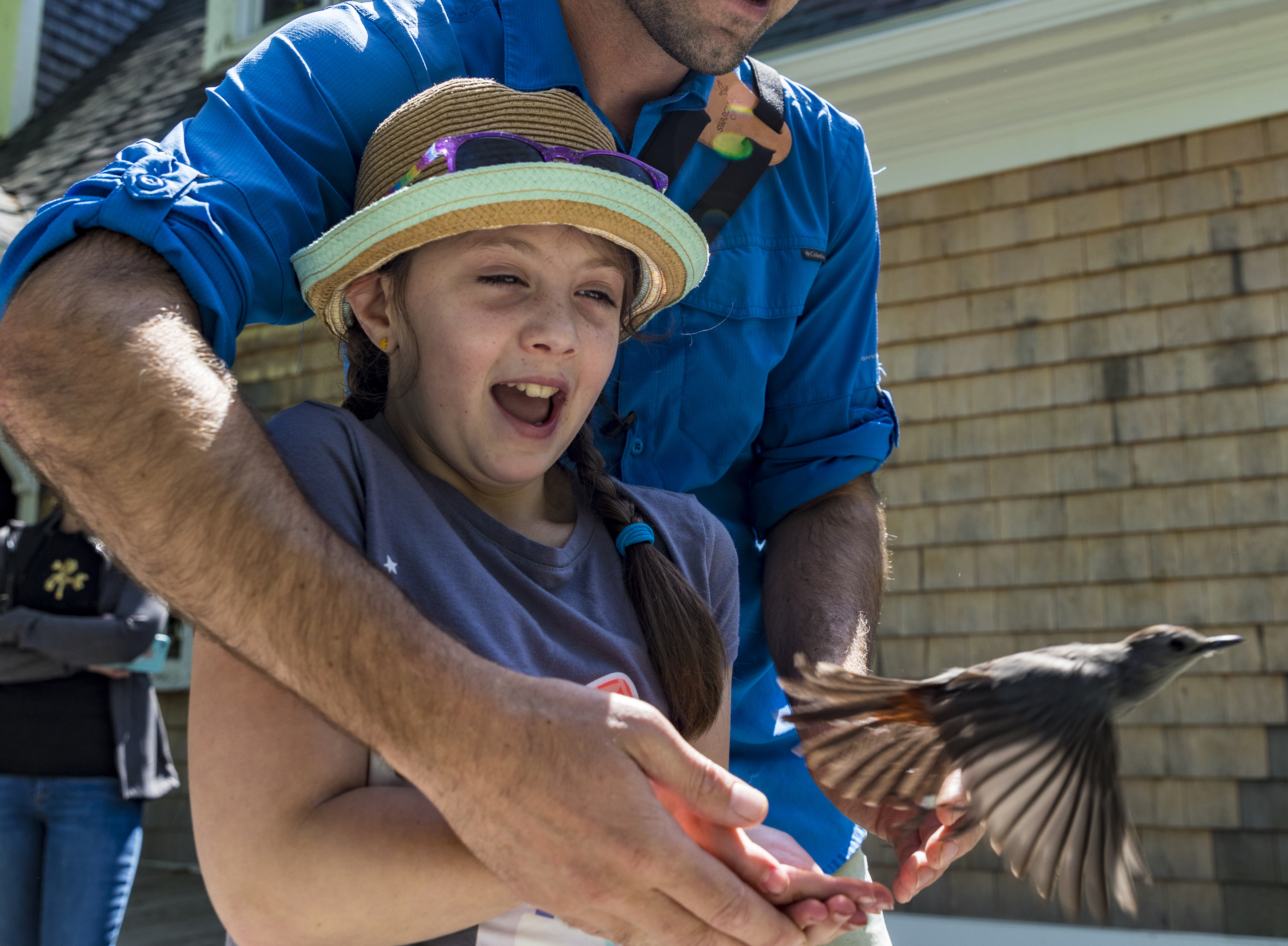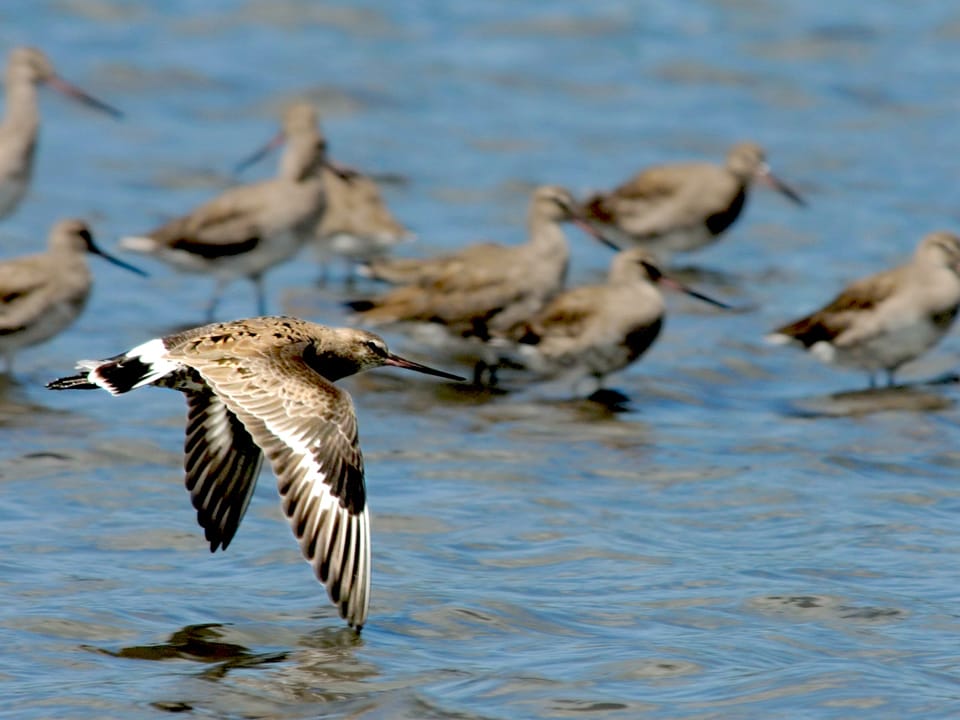Manomet Inc. offers opportunities to learn more about the amazing birds that visit our region
Plymouth, MA, April 10, 2019—Spring is when birds of all kinds begin their epic migration from Central and South America to their northern breeding grounds. Shorebirds, including plovers, sandpipers, and oystercatchers, will rely on Massachusetts beaches as a resting and refueling site in May and June on their way to the Arctic where they will attempt to mate, nest, and raise young before heading south again in the late summer months. Landbirds, like warblers, thrushes, and vireos, depend on the abundance of caterpillars and other insects that thrive in our forests as they move through on their way to more northern states and the boreal forests of Canada for the summer. As if flying nonstop for thousands of miles weren’t challenging enough, these long distance migrants also face threats posed by climate change throughout their harrowing journey.
Manomet, Inc.’s (formerly known as Manomet Bird Observatory) bird banding lab will open for its 54th spring season on April 16, marking the start of migration for billions of birds in the Western Hemisphere. Landbird Conservation program staff members Trevor Lloyd-Evans, Director, and Evan Dalton, Lead Instructor, will oversee the lab’s eight-week operation alongside four seasonal researchers who will catch, band, and release migrating landbirds Mondays through Fridays, dawn to dusk, until June 15.
Manomet’s landbird staff band an average of 1,000 birds of 60 to 70 species every spring. Over the course of its long history (established in 1966), the banding lab has seen significant changes in the way birds are migrating. “We have maintained migration data for over 50 years at Manomet, so we’re able to look at trends over a long time,” says Lloyd-Evans. “In general, we see that birds are arriving sooner than they used to due to earlier leaf-out in the spring, which is caused by warming temperatures. Insects that feed on tree leaves may also be decreasing in numbers and shifting their emergence dates, which impacts birds that rely on these insects as an important food source during migration. Other factors like deforestation and the rise of certain invasive species have also significantly contributed to a change in landbird populations.”
The banding lab hosts numerous educational events throughout the season; visit www.manomet.org to learn more about upcoming classes and opportunities to visit.
Outreach and education have been critical in raising awareness and engaging people with issues affecting migrating birds, and public programs are a large part of these efforts. This season, Manomet, Duxbury Bay Maritime School, and Sustainable Duxbury are co-hosting a three-part speaker series, A Planet of Change, to connect local residents with different facets of Manomet’s research. On April 25, Lloyd-Evans, Dalton, and Brad Winn, Director of Shorebird Habitat Management, will join together to present the second topic in the series, “New England’s Migrant Birds in a Changing Hemisphere,” combining their science, outreach, and education work.
Manomet’s shorebird scientists have studied the population dynamics of shorebirds for nearly 50 years. And while it is clear that many species of shorebirds show an overall decline, like songbirds, there is still much to learn about migration and how to recover populations that have been devastated by climate change and human activity.
Learn more at www.manomet.org/events. Presentations in this series are free and open to the public, but registration is required. Event schedule:
- New England’s Migrant Birds in a Changing Hemisphere | Thursday, April 25, 7:00—8:30PM | Duxbury Bay Maritime School, 457 Washington Street, Duxbury, MA 02332
- Investing for our Future | Thursday, May 16, 7:00—8:30PM | Duxbury Bay Maritime School, 457 Washington Street, Duxbury, MA 02332
About Manomet
Manomet is a nonprofit organization that believes people can live and work today in ways that will enable our world to thrive and prosper tomorrow. Manomet’s mission: applying science and engaging people to sustain our world. Visit www.manomet.org for more information.
About Duxbury Bay Maritime School
The mission of the Duxbury Bay Maritime School is to connect people of all ages, abilities and means to Duxbury Bay through educational and recreational programs that stimulate individual growth and an enduring love and appreciation of the sea. Visit www.dbms.org to learn more.
About Sustainable Duxbury
Sustainable Duxbury’s mission is to encourage Duxbury to become more sustainable by informing ourselves and the community about practical energy-saving measures, adapting them ourselves, facilitating their use by others and supporting town, state and federal energy independence initiatives. You may contact them at www.sustainablesouthshore.org.





 Back to all
Back to all



